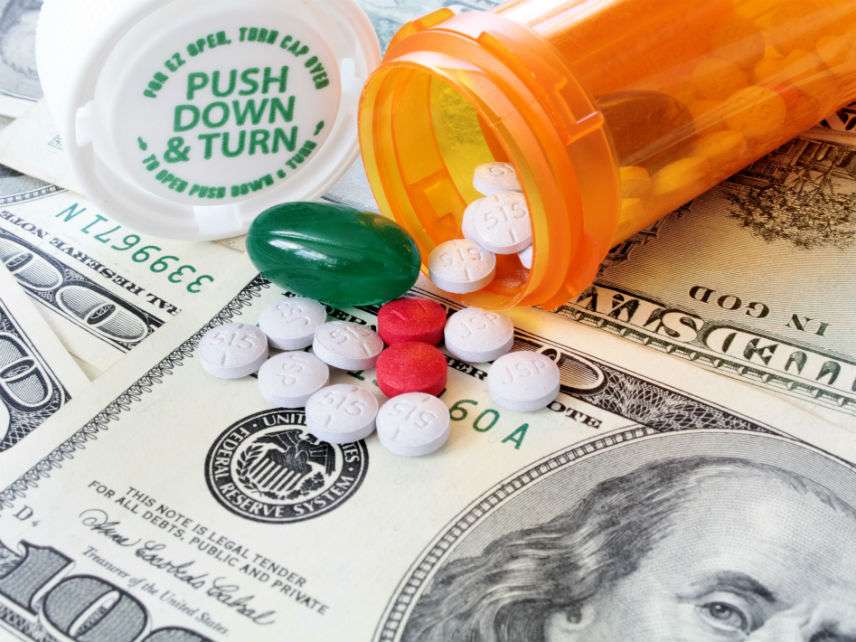Trump's Prescription Drug Price Controls Would Save Us Money. They Would Also Make Us Sicker.

"One of my greatest priorities is to reduce the price of prescription drugs," declared President Donald Trump during his State of the Union address tonight. He added, "In many other countries, these drugs cost far less than what we pay in the United States. That is why I have directed my Administration to make fixing the injustice of high drug prices one of our top priorities. Prices will come down."
The president is reprising his claims in his first post-election press conference last year. Last January, President Trump declared that pharmaceutical companies are "getting away with murder" by pricing their drugs too high. "Pharma has a lot of lobbies, a lot of lobbyists, and a lot of power. And there's very little bidding on drugs," Trump said in January. "We're the largest buyer of drugs in the world, and yet we don't bid properly."
The president is right that drugs often cost far less in other countries than they do here. Why? Two words: Price controls. Basically, the government health care systems in other countries simply tell pharmaceutical companies what they will pay for their drugs. Drug companies put up with price controls in other countries because they can still make money because the controlled prices still cover the costs of making the marginal pill. Consequently, paying for the global costs of research and development for new drugs is made up by charging Americans higher unregulated prices.
Drug price controls would indeed save the government and consumers money, but at the cost of shorter and sicker lives. As I reported earlier:
A 2013 study by Dean Baker, co-director of the Center for Economic and Policy Research, …calculated that drug price controls could save Medicare between $24.8 and $58.3 billion annually. On the other hand, less revenue to pharmaceutical companies means less money devoted to research and development. A separate study, published in Managerial and Decision Economics in 2007, estimated that cutting prices by 40 to 50 percent in the U.S. will lead to between 30 and 60 percent fewer R&D projects being undertaken. Reduced investments in pharmaceutical R&D consequently results in reduced numbers of new drugs becoming available to patients. A 2009 study in Health Affairs calculated that as a result of fewer innovative pharmaceuticals being developed, average American life expectancy in 2060 would be around 2 years lower than it would otherwise have been.
Over at STAT, Robert J. Easton, co-chairman of the medical business consultancy Bionest Partners, cogently explains:
If U.S. drug prices come under bureaucratic control, as they have in most of Europe and Japan, it will be a different story. Little pharmaceutical innovation occurs in price-control jurisdictions. The United States has always, by a large margin, led the world as a source of new drugs, and that lead has widened as Japan and Germany have imposed price controls over the past few decades. All major international pharmaceutical companies, without exception, have instituted R&D and commercial operations in the U.S. to take advantage of its pricing environment.
If price controls pressure the U.S. industry into a more conventional process industry model, like that of the chemical industry, pharmaceutical R&D budgets would be slashed.
We can hope that the president is actually signaling that his administration intends to rev up pharmaceutical price competition. The good news is that Scott Gottlieb, the new head of the Food and Drug Administration intends to increase competition that by hastening the approval of hundreds of generic drugs that have been stuck the agency's approval pipeline. An FDA study has found that as the number of competing manufacturers for a drug goes up, the price falls dramatically. When two companies compete, the price falls an average of just 6 percent; when there are nine competitors, the price drops by an average of 80 percent.
If President Trump and Congress seek to "fix the injustice of high drug prices" by imposing price controls, Americans will save some money now, but at the long-run cost of living sicker and shorter lives. That would be a real injustice.
For more background, see my article, "President Trump: Pharmaceutical Price Controls Are A Bad Idea."


Show Comments (59)